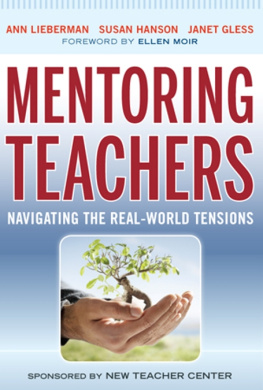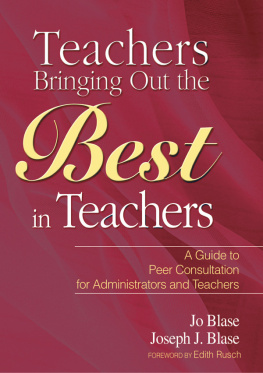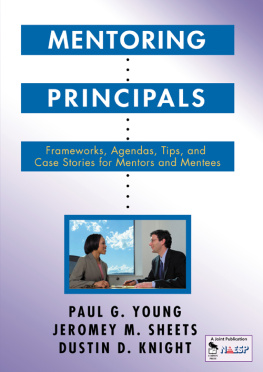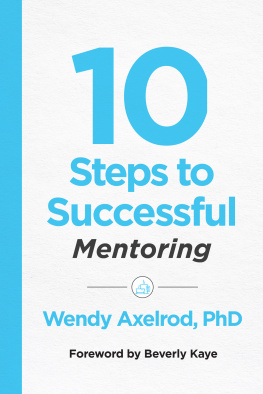The New Teacher Center
New Teacher Center focuses on improving student learning by accelerating the effectiveness of new teachers. NTC partners with states, school districts, and policy makers to implement programs that create sustainable, high-quality mentoring and professional development; build leadership capacity; work to enhance teaching conditions; improve retention, and transform schools into vibrant learning communities where all students succeed.
Copyright 2012 by the New Teacher Center. All rights reserved.
Published by Jossey-Bass
A Wiley Imprint
One Montgomery Street, Suite 1200, San Francisco, CA 94104-4594
www.josseybass.com
No part of this publication may be reproduced, stored in a retrieval system, or transmitted in any form or by any means, electronic, mechanical, photocopying, recording, scanning, or otherwise, except as permitted under Section 107 or 108 of the 1976 United States Copyright Act, without either the prior written permission of the publisher, or authorization through payment of the appropriate per-copy fee to the Copyright Clearance Center, Inc., 222 Rosewood Drive, Danvers, MA 01923, 978-750-8400, fax 978-646-8600, or on the Web at www.copyright.com. Requests to the publisher for permission should be addressed to the Permissions Department, John Wiley & Sons, Inc., 111 River Street, Hoboken, NJ 07030, 201-748-6011, fax 201-748-6008, or online at www.wiley.com/go/permissions.
Limit of Liability/Disclaimer of Warranty: While the publisher and author have used their best efforts in preparing this book, they make no representations or warranties with respect to the accuracy or completeness of the contents of this book and specifically disclaim any implied warranties of merchantability or fitness for a particular purpose. No warranty may be created or extended by sales representatives or written sales materials. The advice and strategies contained herein may not be suitable for your situation. You should consult with a professional where appropriate. Neither the publisher nor author shall be liable for any loss of profit or any other commercial damages, including but not limited to special, incidental, consequential, or other damages. Readers should be aware that Internet Web sites offered as citations and/or sources for further information may have changed or disappeared between the time this was written and when it is read.
Jossey-Bass books and products are available through most bookstores. To contact Jossey-Bass directly call our Customer Care Department within the U.S. at 800-956-7739, outside the U.S. at 317-572-3986, or fax 317-572-4002.
Wiley also publishes its books in a variety of electronic formats and by print-on-demand. Some material included with standard print versions of this book may not be included in e-books or in print-on-demand. If the version of this book that you purchased references media such as CD or DVD that was not included in your purchase, you may download this material at http://booksupport.wiley.com. For more information about Wiley products, visit www.wiley.com.
Library of Congress Cataloging-in-Publication Data
Lieberman, Ann.
Mentoring teachers : navigating the real-world tensions / Ann Lieberman, Susan Hanson, Janet Gless ; Foreword by Ellen Moir ; Sponsored by the New Teacher Center.
p. cm.
Includes index.
ISBN 978-0-470-87412-7 (pbk.); ISBN 978-1-118-13893-9 (ebk.);
ISBN 978-1-118-13894-6 (ebk.); ISBN 978-1-118-13895-3 (ebk.)
1. Mentoring in educationUnited States. 2. TeachersUnited States. 3. Interpersonal relationsUnited States. I. Hanson, Susan, date. II. Gless, Janet. III. Title.
LB1731.4.L54 2012
371.1020973dc23
2011032503
Foreword
When I was working in the schools in Santa Cruz, California, I saw many teachers in their first yearoften the most talented teacherswant to quit. They felt unsuccessful and were concerned that they weren't able to prepare all of their students for academic success. Around that time, a group of us had an opportunity to help new teachers develop a solid base for their teaching. We realized that the first two years, called the induction years, are crucial in a teacher's career. So we began to build what we called instructional mentoring during those induction years. The big idea was to mentor beginning teachers in such a way that they would help all of their students learn, regardless of their socioeconomic background. In addition, they would grow as teacher leaders and stay longer in the teaching profession. We realized then that we could build a program in which we would carefully select expert teachers and provide them with rigorous training that would prepare them to mentor new teachers, building on the teachers' existing knowledge and enhancing it enough so that they would help their students learn better and feel competent and confident in their teaching. Thirteen years later, the New Teacher Center (NTC) reaches tens of thousands of teachers across the country and nearly two million students. Not only do we help new teachers become excellent at their profession, but we also build the human capital capacity in districts and states: the new teachers become more effective and stay in the classroom longer and the mentor teachers hone their expert practice even more, often becoming school and district leaders later on.
My dream was that in addition to helping ensure that every student has a great teacher, we would someday influence the national dialogue and national policy on mentoring all new teachers during their induction years. Now, our influence has been spreading throughout the United States in different districts with varying contexts. The NTC has helped the field understand the importance of induction, the role of the mentor, and how to create strong, instructional mentoring programs that help new teachers become excellent teachers for their students.
In this process, we have learned a lot, too. Through our work, we have learned how to listen carefully and collaborate in ways that can help new teachers across the country improve student achievement in their classrooms. We have conducted a number of studies comparing new teachers with and without mentors to discover the impact on student achievement. And the evidence (including Fletcher, Strong, and Villar, 2008) has shown that those mentored by the New Teacher Center have done better than those who weren't mentored.
This work is about ordinary people doing extraordinary things. Teaching new teachers is a relatively new idea that builds human capital. Mentors who learn to do this work are making an important contribution not just with their mentees, but also by helping to develop the professionalization of teaching.
We have learned that mentor preparation and continual learning is an important part of the mentor's education as well. Mentor forums are opportunities for the professional development of mentors because they get exposure to different kinds of problems and ways to solve them. Learning for mentors is as important as learning for new teachers.
This book couldn't come at a better time. Mentoring is now a part of the national dialogue on education. Numerous districts have found that they can accelerate teacher effectiveness and improve student learning when their teachers have been mentored through the New Teacher Center model. To be a good mentor and a good leader, mentors must learn how to negotiate their way through many different cultures: getting to know the teacher culture, working with principals, figuring out how to approach their mentees, and more. Navigating these tensions and learning from them is what this book is about. Its importance lies in giving us a deeper picture of the life and learning of mentorsimportant knowledge that we can use in building a cadre of mentor teacher leaders.












